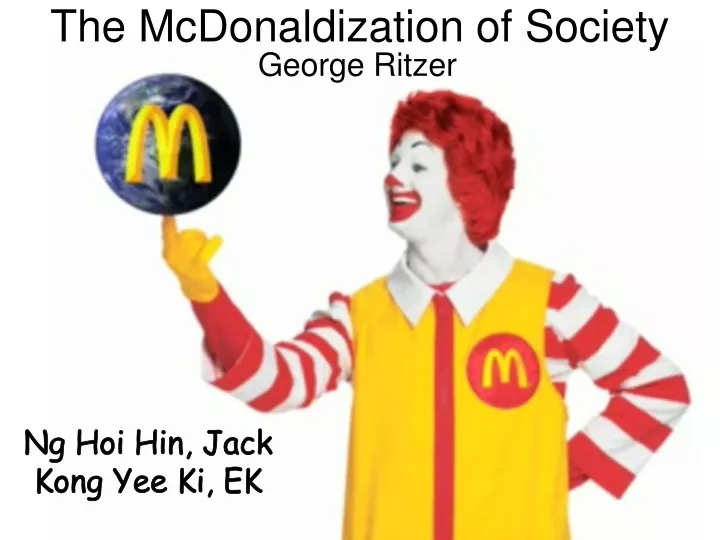Remember that time you were rushing to catch a train, starving but with only minutes to spare? You knew exactly where to go: a fast food joint. A familiar menu, predictable service, and lightning-fast order fulfillment. That experience—the essence of efficiency—is what sociologist George Ritzer coined as Mcdonaldization, a term that describes the process by which principles of fast food restaurants have infiltrated various facets of society.

Image: www.researchgate.net
Mcdonaldization isn’t just about burgers and fries. It’s a broader societal phenomenon where rationality, efficiency, predictability, and control pervade our lives. From education to healthcare, shopping to leisure, we are constantly bombarded with the principles of fast food restaurants. While Mcdonaldization offers convenience and affordability, it also poses significant challenges to our social fabric and individual well-being.
Understanding Mcdonaldization: A Deeper Dive
At its core, Mcdonaldization embodies four key principles:
- Efficiency: Minimizing time and resources to achieve a desired outcome. Think about how a fast food chain streamlines operations to serve customers quickly.
- Calculability: Emphasizing quantity over quality. This translates to “supersizing” portions or offering discounts based on volume.
- Predictability: Delivering consistent products and experiences every time. The familiar taste of a Big Mac or the predictable layout of a coffee shop fosters a sense of comfort.
- Control: Replacing human judgment with standardized procedures. From automated ordering kiosks to pre-programmed cooking equipment, these technologies ensure uniformity and limit variability.
The All-Encompassing Impact of Mcdonaldization
The influence of Mcdonaldization extends beyond the realm of restaurants. Its principles have permeated various aspects of life:
- Education: Standardized testing, pre-determined curriculum, and online learning platforms mirror efficiency and predictability.
- Healthcare: Diagnostic algorithms, assembly line procedures, and emphasis on cost-effectiveness reflect the principles of calculability and control.
- Retail: Online shopping, self-checkout kiosks, and personalized advertising leverage efficiency, control, and predictability.
- Travel: Budget airlines, package tours, and standardized accommodations prioritize efficiency and cost-effectiveness over personalized experiences.
The Benefits and Drawbacks of Mcdonaldization
While Mcdonaldization offers obvious advantages, such as convenience and affordability, its shadow looms large. While it’s easy to get what we need quickly, that rush of efficiency can come at the cost of:
- Depersonalization: Standardized interactions and limited human contact can erode a sense of community and human connection.
- Loss of Individuality: The relentless pursuit of efficiency and predictability can stifle creativity, originality, and individuality.
- Ethical Concerns: Exploitation of workers, environmental degradation, and consumer exploitation can arise from the relentless focus on profit maximization.

Image: www.slideserve.com
Navigating the Mcdonaldization Matrix
Mcdonaldization is an undeniable trend, shaping our world in profound ways. It’s important to recognize both its merits and downsides. By understanding the forces driving Mcdonaldization, we can make more informed choices about how we consume, interact, and shape our world.
Embrace the Positives, Mitigate the Negatives:
Mcdonaldization doesn’t have to be entirely negative. By embracing its positive aspects, such as efficiency, while also advocating for ethical practices and human connections, we can harness its power for a more balanced society.
- Seek out alternatives: Support small businesses, local farmers markets, and craft shops that value quality over quantity.
- Embrace the “slow food” movement: Engage in mindful eating, appreciate the culinary experience, and reduce food waste.
- Prioritize human connection: Make time for genuine interactions, engage in meaningful conversations, and participate in community activities.
- Support ethical businesses: Patronize companies that prioritize fair wages, sustainability, and social responsibility.
FAQ
What are some examples of Mcdonaldization in everyday life?
Think about online dating apps where profiles are simplified and choices presented quickly. Similarly, university courses often prioritize standardized testing over critical thinking skills. In the realm of entertainment, streaming services offer a vast catalog, catering to efficiency and predictability.
Are there any positive aspects of Mcdonaldization?
Indeed. Mcdonaldization can lead to increased efficiency and affordability, making goods and services more accessible. The predictability of fast food chains can be comforting for people on the go.
How can we combat the negative aspects of Mcdonaldization?
We can advocate for policies that promote ethical labor practices, support local businesses and slow food movements, and prioritize human interaction over automation.
Mcdonaldization In Society
Conclusion
Mcdonaldization, the process of standardizing and streamlining various aspects of our lives, has become an undeniable force in modern society. While it offers efficiency and predictability, we must be mindful of its potential downsides, including depersonalization, loss of individuality, and ethical concerns. By embracing a more balanced approach, we can retain the benefits of Mcdonaldization while safeguarding the unique qualities that make us human.
Are you interested in learning more about the impact of Mcdonaldization on our society? Share your thoughts and experiences in the comments below!





